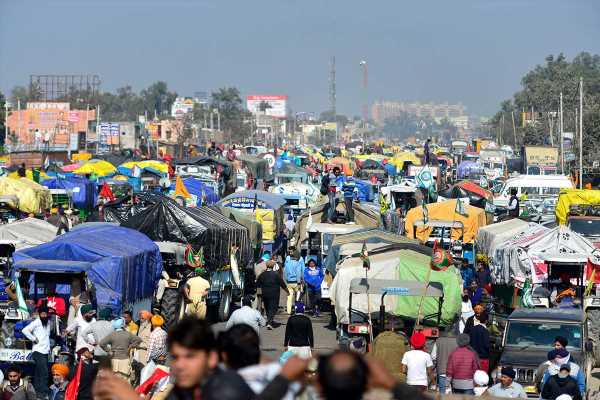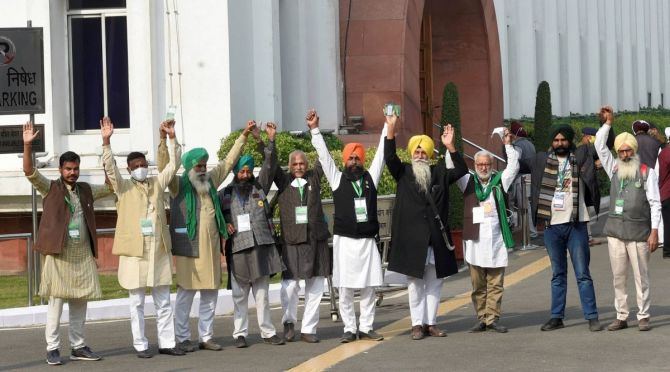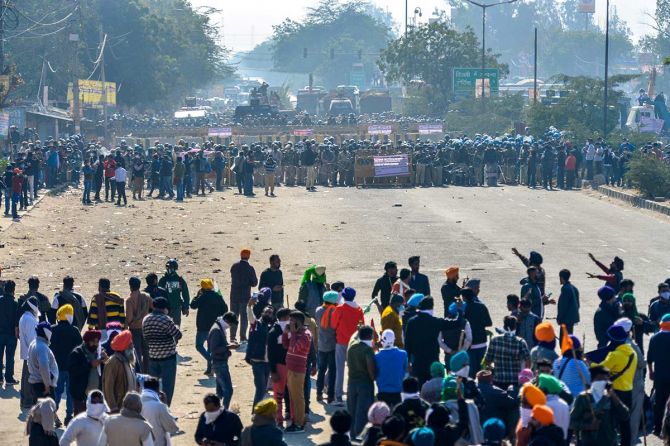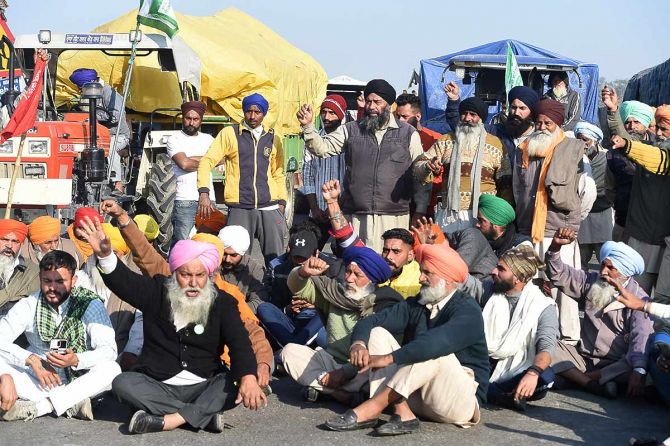The Sikhs love a good fight, and that’s what the Modi government has given them, observes Shekhar Gupta.
How well does the BJP understand politics?
You would perhaps be asked to go get your head examined for even asking that question.
Of course, it understands politics better than any others in India by a distance, as much as the gap between 303 and 52 Lok Sabha seats.
Then you finesse the question.
How well does the BJP understand the politics of Punjab? The answer will be, I am afraid, very poorly.
Definitely the Modi-Shah BJP does not understand Punjab, the Punjabis, their politics, or even, more specifically, the Sikhs.
Or, they wouldn’t have dug themselves into such a hole (pun intended) over their handling of the Punjab farmers’ protests.
They’ve continued to dig it deeper rather than extricate themselves over what are, in all honesty, a fine set of reformist new laws on agricultural economics.
Before we dive into some of the more complex issues involved here, let’s check out some basics.
Punjab stands out as the outlier even in the north to defy the Modi magic.
Even when Narendra Modi himself is in the contention, as in the general elections of 2014 and 2019, the Punjabis were not impressed.
This, despite the BJP having a formidable ally, Shiromani Akali Dal, the pre-eminent Sikh party.
For evidence, watch how in both elections it failed to get two stellar candidates, Arun Jaitley and Hardeep Singh Puri, respectively, elected from Amritsar despite Akali support.
It is also the only state in the north where the Modi wave was stopped in both elections.
And no, the Punjabis did not even have to dig moats in the highways, throw boulders, or raise barricades to stop it.
Election after election, with the 2017 assembly polls thrown in, Mr Modi addressed rallies dressed in saffron turban.
But it failed in Punjab while he dominated next-door Haryana and Himachal Pradesh.
If three reversals of their almighty waves over five years haven’t convinced Mr Modi and Amit Shah of the need for a rethink, the shambles over this farmers’ protest should.
And if even this doesn’t, then it shows lack of political intellect as well as humility deficiency.
The BJP dismisses its critics as the deracinated, English-medium Lutyens-walas, and takes pride in its native smarts.
It should then learn from that oldest heartland wisdom: You cannot snatch a sugarcane from the field of a farmer (Jat), but can easily charm him into gifting you a full slab of jaggery (gud).
With a big smile, a hug, and maybe some lassi too.
You just have to begin with your head bowed, not in submission, but politeness and friendship.
On the farm Bills, this BJP has done the opposite.
The Modi-Shah BJP’s fundamental politics runs on four wheels: Mr Modi’s personal popularity, polarisation (Hindutva), non-corrupt image, and nationalism.
Why has it failed in Punjab?
Even on the farm Bills, there is hardly a buzz in the other major farming states. Maharashtra, with a massive agricultural population and an established record of farmer politics and protests, is calm.
Why’s Punjab angry? Because the state is different, as are the Sikhs.
One of the four wheels of the BJP’s juggernaut is polarisation.
Now, that option is missing in Punjab in the conventional, Hindu-Muslim sense.
This is difficult to explain to a BJP/RSS mind, but the fear of the Muslim among the Sikhs is nothing compared to what you might find, or be able to build, in Uttar Pradesh, Gujarat, the Brahmaputra Valley, or North Bengal.
The few Muslims who live in Punjab, in the tiny enclave of Malerkotla, have enjoyed the Sikhs’ affection and protection since the times of the Tenth Guru, Guru Gobind Singh, because the nawab here tried to protect the Guru’s sons from Aurangzeb.
It isn’t just revenge that the Sikhs have a long memory for.
It is also for gratitude.
Traditionally, the RSS and the BJP, in that order, have seen the Sikhs as fellow Hindus although turned out differently.
That the Gurus fought and sacrificed their lives to protect the Hindus, that the Punjabi saying that the Hindus and Sikhs are inseparable parts of one body like fingers and nails, and that Punjab is the sword arm of India, are all correct.
Yet, the Sikhs are not Hindus.
They are not impressed by Hindutva. If they were, they would not have rejected Mr Modi at his peak thrice.
We learnt this in Bhindranwale’s heyday.
The RSS then wouldn’t believe that the Sikhs could turn on the Hindus in Punjab.
Balasaheb Deoras, then the RSS sarsanghchalak, made a statement that there was no difference or dispute between the Hindus and Sikhs, who were, after all, keshdhari (hair-bearing) Hindus.
Some of us journalists happened to be sitting in Bhindranwale’s durbar at the Golden Temple, as was customary.
He said, with a smirk with the width of the Sutlej in flood, if ‘that ‘knickerdhari‘ says we Sikhs are keshdhari Hindus, what will he call the Muslims? Sunnatdhari (circumcised) Hindus?’
To understand how complex and different Punjab is, stay with me.
Bhindranwale and his people demanded distinct minority status and a separate personal law for the Sikhs.
A delegation of the richest Sikhs came to his durbar with folded hands. ‘Don’t do this, Santji,’ they pleaded. ‘We shouldn’t lose our tax benefits under HUF (Hindu Undivided Family).’
The Sikh-Hindu divide was deepened during the Akalis’ Punjabi Suba movement in the 1960s, when the RSS/Bharatiya Jana Sangh opposed it.
The first time the two sides came close to each other was when Indira Gandhi locked them up in the same jails during the Emergency.
After 1977, the Akalis and the former Jana Sangh elements (then in the Janata Party) joined hands.
But the breakup came soon enough, on linguistic, cultural, and religious lines.
Then followed the decade of terror. The RSS/BJP were among the targets.
The resurgent BJP under Atal Bihari Vajpayee and Lal Krishna Advani understood that the only solution to stabilising Punjab, and to also make the BJP grow there, was to bring the Hindus and Sikhs together again.
They picked up the thread from their conversations in jail with Akali leaders of similar thinking, now chastened by the Bhindranwale shock.
That is how the SAD-BJP alliance came up.
The BJP was happy to be the junior partner.
In national politics and the Union cabinet the Akalis, especially Parkash Singh Badal, were given the pride of place.
Madan Lal Khurana was specifically assigned the job of keeping the relationship smooth.
This BJP has arrogantly broken that bond.
Rather than be respectful partners, this BJP has tended to patronise Punjab and the Sikhs.
This involves many errors of judgement.
One, Punjab is not a monolith.
Second, nor are the Sikhs. They have their divisions of caste and clan.
In fact, most of the prominent Sikhs you see in the BJP’s ranks are not from the Jat (or Jatt, as the Punjabis say) community, which dominates the land-owning peasantry and will defy all cordons and moats to reach where it wishes.
And third, the Sikhs are not Hindus. Not like the Hindus in Vadodara, Varanasi, or Vidarbha.
The Sikh peasantry, especially Jatts, also revels in agitation.
This goes back to the ‘Pagdi Sambhal Jatta‘ movement in the early 20th century, launched by Sardar Ajit Singh.
Its slogan also became the anthem of his nephew’s incredibly brave revolution.
The nephew is Shaheed Bhagat Singh, whom everybody swears by — the Left, Right, and Centre.
During the Emergency, the largest contingent in jail after the RSS was the Akalis.
The Sikhs love a good fight, and that’s what the Modi government has given them.
It won’t work. You have to reason with the Punjabis. They are entrepreneurial, and they might see the merit of these reforms.
But if you want to thrust it down their throat, see you at the barricades.
The final point: Punjab is not part of the Hindi/Hindu heartland.
Your usual Hindu-Muslim polarisation is not available as a strategy here.
You can polarise, though, again on Hindu-Sikh lines.
Nobody should want it. But, if you do, press on with the canard the farmers are influenced by Khalistanis. Go ahead, paint the devil on the wall.
By Special Arrangement with The Print
- Modi’s Farm Laws
Feature Presentation: Aslam Hunani/Rediff.com
Source: Read Full Article




